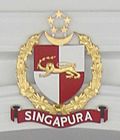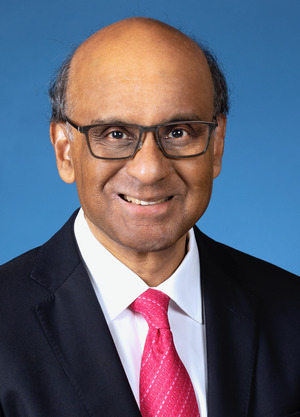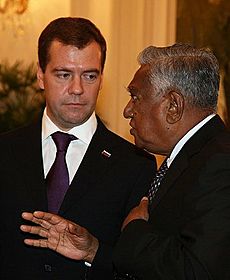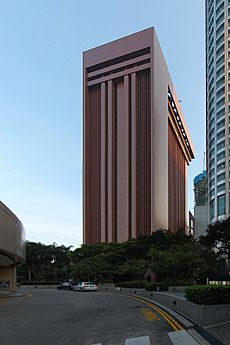President of Singapore facts for kids
Quick facts for kids President of the Republic of Singapore |
|
|---|---|

|
|

Presidential coat of arms
|
|
| Head of state of the Republic of Singapore | |
| Style |
|
| Residence | The Istana |
| Appointer | Parliament (1965–1991) Direct election (1991–present) |
| Term length | Six years,
renewable
|
| Constituting instrument | Constitution of Singapore (1965) |
| Precursor | Yang di-Pertuan Negara of Singapore |
| Formation | 9 August 1965 |
| First holder | Yusof Ishak |
| Deputy | Chairman of the Council of Presidential Advisers |
| Salary | S$1,540,000 annually ($1,133,598 USD) |
The President of the Republic of Singapore is the head of state of Singapore. This means the President is the official representative of the country. The President also has special powers over the government of Singapore. These powers include managing the country's national savings and approving important public service jobs.
Singapore became fully self-governing from the British Empire in 1959. At that time, the ceremonial role of Yang di-Pertuan Negara (meaning "Lord of the State") was created. After Singapore gained independence in 1965, this role became the President of Singapore.
Initially, the President's job was mostly symbolic. They had very few real powers. Before 1991, the President was chosen only by Parliament. Singapore uses a Westminster parliamentary system. In this system, the President is the head of state, but not the head of government. The main powers of government belong to the Cabinet, led by the Prime Minister.
In 1991, the Constitution was changed. This change allowed the President to be directly elected by the people. The first direct election happened in 1993. Since 1991, the elected President has important powers. For example, they can stop the government from using the country's past financial savings. They also have the power to approve or reject the hiring or firing of key public officials.
Another change to the Constitution was made in 2016. This change allows a presidential election to be set aside for a specific ethnic group. This happens if no one from that group has been president in the previous five terms. There is no limit to how many terms a person can serve as President.
The President must act fairly and not take sides in politics. According to the Constitution, the President must be a Singaporean citizen. They must also be non-political and elected by popular vote. The current President is Tharman Shanmugaratnam. He started his term on September 14, 2023. He was elected in the 2023 presidential election with 70.41% of the votes.
Contents
History of the Presidency
The office of President of Singapore began on December 22, 1965. This date was set to be effective from August 9, 1965, when Singapore became independent from Malaysia. It took over from the office of Yang di-Pertuan Negara. This earlier office was created when Singapore became fully self-governing in 1959.
The last Yang di-Pertuan Negara, Yusof Ishak, became the first President. After he passed away in 1970, Benjamin Sheares became President in 1971. He was appointed by Parliament and served until his death in 1981.
Sheares was followed by Devan Nair, who resigned in 1985. Wee Kim Wee then became President. He served until 1993 and was the first President to use the new powers from the 1991 constitutional changes.
In the early 1980s, the People's Action Party (PAP) was concerned about the country's financial savings. They worried that a future government might spend all the national reserves. So, in January 1991, the Constitution was changed. This change redefined the President's role.
The new rules said the President would be elected by popular vote. They also had to meet strict requirements. The President was given the power to veto (reject) the use of the country's reserves. They could also approve or reject public service appointments. The President can also review how the government uses certain laws, like the Internal Security Act. They can also agree with the Corrupt Practices Investigation Bureau (CPIB) to investigate corruption, even if the Prime Minister disagrees.
The first elected President was Ong Teng Cheong. He won the 1993 presidential election and served from 1993 to 1999. The Singapore Government officially considers Wee Kim Wee as the first elected President. This is because he held and used the powers of an elected president due to special rules.
The sixth President was S. R. Nathan. He served as Ambassador to the United States before becoming President. He ran unopposed in 1999 and 2005 because he was the only qualified candidate. He served two terms until 2011.
After S. R. Nathan, Tony Tan won the 2011 presidential election by a small number of votes. He became the seventh President on September 1, 2011.
In 2016, more changes were made to the Constitution. These changes created "reserved elections" for specific ethnic groups. This happens if that group has not had a President in the past five terms.
The eighth President, Halimah Yacob, took office on September 14, 2017. She was the only eligible candidate under the new rules. Yacob was also the first Malay head of state in 47 years. She was also the first female President.
On September 1, 2023, Tharman Shanmugaratnam won the 2023 presidential election. He was elected the ninth President of Singapore with 70.41% of the votes.
In November 2023, Parliament passed a law allowing the President to hold international roles in their private life. This is only allowed if the role benefits Singapore.
What the President Does
The President is Singapore's head of state. Their job is to protect Singapore's national savings and ensure the public service is fair. The President has executive power, which means they can make decisions for the country. However, usually, the President acts on the advice of the Cabinet or a minister.
But the President can make some decisions on their own. For example, they can stop the government from using savings that were not earned during its current term. They can also approve or reject appointments for important public jobs. These include the Chief Justice and Commissioner of Police. The President also oversees the Corrupt Practices Investigation Bureau (CPIB).
The President also plays a role in making laws with Parliament. Their main job in law-making is to approve bills passed by Parliament. The President usually opens each parliamentary session with a speech. This speech outlines the government's plans. The President can also speak to Parliament and send messages.
The President is often called "Singapore's No. 1 diplomat." Ambassadors from other countries meet the President. The President also meets foreign leaders who visit Singapore. They also travel overseas to help Singapore's international relations. The President is also the head of the National University of Singapore and the Nanyang Technological University.
Presidents have also supported good causes. Wee Kim Wee promoted sports. Ong Teng Cheong supported culture and arts. S. R. Nathan started the President's Challenge. This effort has raised over S$100 million for charities.
Presidential Powers
The President's powers are divided into two types. Some powers can be used by the President alone. Other powers must be used with the advice of the Cabinet or a minister. The President must also consult the Council of Presidential Advisers (CPA) for some duties. For other duties, they can consult the CPA if they wish, but it is not required.
The Constitution gives the President powers to prevent the government from using national savings that were not accumulated during its current term. So, the government needs the President's approval to give guarantees or raise loans. The President's approval is also needed for budgets of certain government boards and companies that use their past savings.
The President can also reject any bill in Parliament that would change how the Central Provident Fund Board invests money. They can also reject bills about borrowing money or raising loans if it would use past reserves. The President can also reject budget bills if they think it will use past reserves.
The President also approves changes to key government appointments. These include the Chief Justice and Prime Minister. The President chooses a Member of Parliament (MP) who they believe has the support of most MPs to be Prime Minister. The President also has power over the Corrupt Practices Investigation Bureau. They also oversee decisions made under the Internal Security Act.
Under the Singapore Armed Forces Act, the President can create and maintain the Singapore Armed Forces (SAF). The President can also form or close units within the SAF.
The first elected President, Ong Teng Cheong, had disagreements with the government. These were about the extent of his financial powers. In 2009, the government asked President S. R. Nathan for approval. They needed to use $4.9 billion from past financial reserves. This was the first time this had happened. The money was used to help save jobs and businesses during a difficult economic period.
How the President is Elected
To become President, a person must meet strict requirements from the Constitution.
Who Can Be President?
- Must be a citizen of Singapore.
- Must be at least 45 years old.
- Must be registered to vote.
- Must have lived in Singapore for at least ten years before the election.
- Must not have certain disqualifications. For example, they cannot be of unsound mind or an undischarged bankrupt. They also cannot have been convicted of certain crimes.
- Must be a person of good character and reputation.
- Must not be a member of any political party on the day they are nominated.
- Must have held a senior position for at least three years. This could be as a Minister, Chief Justice, Speaker of Parliament, or CEO of a major government company. It could also be a senior role in a large private company.
These strict rules have led to some elections where only one candidate qualified. This happened in 1999, 2005, and 2017.
In November 2016, new rules were added for "reserved elections." This means an election can be set aside for a specific racial group. This happens if that group has not had a President for five terms. Other changes made it easier for candidates with private sector experience to qualify.
Election Process
The President serves for six years. If the President cannot finish their term, an election must be held within six months. Otherwise, an election can happen up to three months before the current President's term ends.
The election process starts when the Prime Minister announces the nomination day. People who want to run must get a certificate from the Presidential Elections Committee (PEC). This committee checks if candidates meet the requirements. The PEC makes sure candidates are honest and have good character. They also check if candidates have enough experience in managing finances.
Candidates must also get certificates about political donations. They must file their nomination papers on nomination day. A deposit must also be paid. If only one candidate is nominated, that person is declared President. If there is more than one candidate, a polling day is set for voting.
During the election period, candidates cannot spend too much money on campaigning. They also need permits for meetings and posters. Certain actions like bribery are against the law. The day before polling day is a "cooling-off day." No campaigning is allowed on this day or on polling day.
Polling day is a public holiday, and voting is required. Voters go to their assigned polling stations. After voting closes, ballot boxes are sealed and taken to counting centers. Candidates or their agents can ask for a recount if the vote difference is very small. The candidate with the most votes is declared President.
Last Election
The 2023 presidential election was the first election with more than one candidate since 2011. Tharman Shanmugaratnam won this election. He received 1,746,427 votes, which was 70.40% of the valid votes.
Starting the Job and Rules
The elected President starts their job on the day the previous President leaves office. If the office is empty, they start the day after the election. When they start, the President must take an Oath of Office. This oath promises to do their duties faithfully and protect the Constitution.
Once elected, the President must follow certain rules:
- They cannot hold any other official job.
- They cannot actively be involved in any business.
- They cannot be a member of any political party.
- They cannot serve in Parliament.
Who Takes Over if the President Can't Serve?
If the President cannot do their job, their powers temporarily go to the chairman of the Council of Presidential Advisers (CPA). If the CPA chairman is not available, the Speaker of Parliament takes over. If both are unavailable, Parliament appoints someone to perform the President's duties.
Salary and Benefits
Parliament sets the President's salary and benefits. This is done through the Civil List and Gratuity Act. As of February 17, 2012, the President's personal pay is $1,568,900. They also receive an entertainment allowance of $73,000. The total amount for the President's personal expenses is $1,646,400. This personal pay was reduced from a higher amount after a review.
The salaries for the President's personal staff are $4,532,400. This amount covers staff salaries and other related costs. The allowance for the Istana's household expenses is $2,762,308. This covers maintenance of the Istana, vehicles, utilities, and ceremonies. This amount increased to cover higher costs for computer systems and building maintenance.
Expenses for "special services" are $550,000. This money covers various costs like replacing state cars. Overall, the current total budget for the President is $9,491,100. This is about 18% less than the previous year's budget.
List of Presidents
See also
 In Spanish: Anexo:Presidentes de Singapur para niños
In Spanish: Anexo:Presidentes de Singapur para niños
- Spouse of the President of Singapore
- Chief Justice of Singapore
- Prime Minister of Singapore




